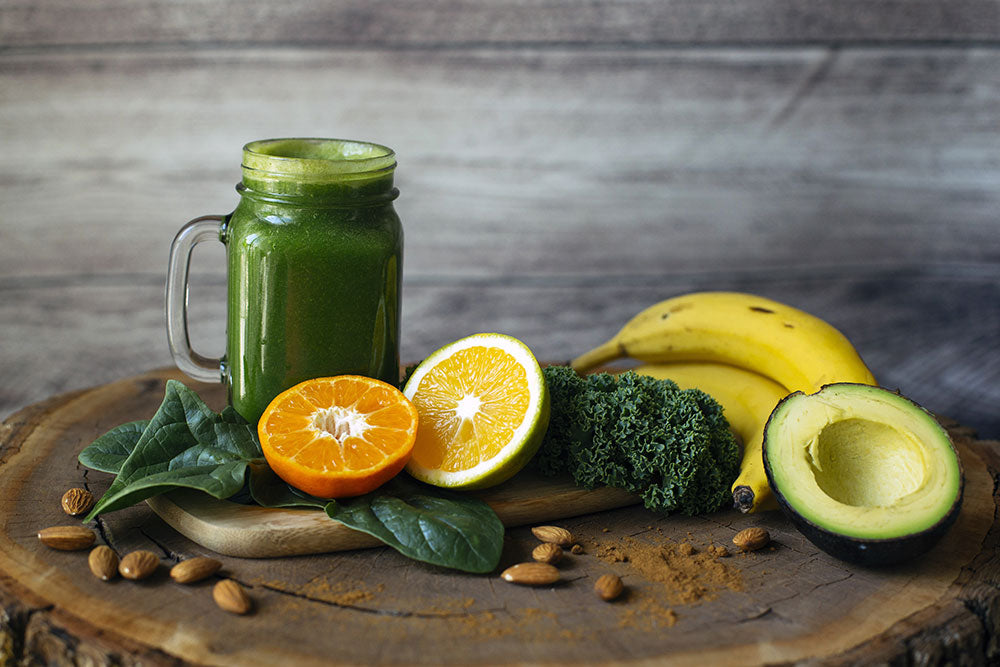Electrolytes play a crucial role in keeping your body healthy and active. Hot and sweaty summer days can leave you lacking these vital minerals though. Here’s how to spot symptoms of electrolyte imbalance and how to ensure a good intake of electrolytes.
What Are Electrolytes?
Electrolytes are minerals that carry an electric charge in the body. These essential electrolyte minerals include:
- Sodium
- Calcium
- Potassium
- Chlorine
- Phosphate
Maintaining the right balance of electrolytes is crucial, especially during physical activity or in hot weather when we lose these minerals through sweat. Electrolytes are also found in blood and urine, so if you urinate a lot (such as when taking diuretics) or experience blood loss, you may well need to top up on electrolytes.
Why? Because these minerals are critical for a whole slew of bodily functions, including:
- Cellular signaling
- Proper fluid balance
- Antioxidant protection
- Blood chemistry regulation
- Muscle action
- Energy production in mitochondria.
It can be tempting to just drink more water when it’s hot or when you sweat a lot, but without electrolytes, that water won’t stay in our cells where we need it.
And when you’re low in electrolytes or these minerals are out of balance, symptoms such as muscle cramps or spasms can arise. This is particularly noticeable after strenuous activity, where muscle pain can be a result of electrolyte depletion, not just going at it too hard.
Natural Sources of Electrolytes
There’s no doubt that electrolytes are important, but it can be hard to maintain proper electrolyte balance sometimes, especially during sweaty summer weather.
Here are some natural sources to help maintain optimal electrolyte levels:
1. Coconut Water
Coconut water is an excellent natural source of electrolytes, particularly potassium and magnesium. Delicious and refreshing, coconut water is an ideal way to replace lost minerals after vigorous exercise or on hot summer days.
Unlike many commercial sports drinks, coconut water is also free from added sugars and artificial ingredients. Just check the labels to make sure you’re getting pure coconut water.
2. Fruits and Vegetables
Most of our electrolyte (and water) intake comes from fruits and vegetables. Some of these are especially good sources of electrolytes though, including:
- Bananas: High in potassium
- Oranges: Rich in potassium and calcium
- Leafy greens (spinach, kale): Good sources of magnesium and calcium
- Avocados: Contain potassium and magnesium
3. Nuts and Seeds
Nuts and seeds are also excellent sources of electrolytes, as well as other minerals, beneficial fats, protein, and vitamins. Consider eating more of the following great sources of electrolytes on hot summer days:
- Almonds: Rich in magnesium
- Pumpkin seeds: High in magnesium and potassium
- Sunflower seeds: Good source of phosphorus and magnesium
4. Sea Salt
Salt seems an obvious source of electrolytes, right? Sort of.
Unfortunately, most types of salt present in our diets are refined, meaning they’re stripped of minerals other than sodium. This can actually lead to an unhealthy electrolyte imbalance and symptoms such as water retention, swelling, and high blood pressure.
In contrast, unrefined sea salt contains a variety of trace minerals and is a good source of both sodium and chloride. Even so, this should be consumed in moderation.
If you have a diet that includes a lot of processed foods, you’ll usually be getting a lot of sodium as this is typically added while other essential minerals are depleted.
5. Cactus pear and dragon fruit
Cactus pear or prickly pear can be eaten raw, in smoothies, or made into jam. It’s a top choice for summer rehydration as it is packed with electrolytes, including magnesium and potassium, and is a good source of water and vitamin C as well.
Dragon fruit not only looks cool, it can help keep you cool. Comprising 84% water, with a good amount of magnesium and potassium, dragon fruit is a seriously rehydrating fruit and a good choice after intense exercise (or as a beach treat).
Hydration Strategies
Water intoxication is a real problem for athletes, as well as for anyone who drinks a lot of plain water because they’re worried about heat stroke and dehydration. Drinking too much water can oversaturate cells, flush electrolytes from the body (ironically), and cause painful muscle cramps, cognitive confusion, and even death.
Sports drinks are a great solution, but not all are created equal. Far from it. Some are little more than salt, sugar, and artificial colours and flavours.
And just like drinking too much plain water can be bad, consuming carbohydrates without electrolytes and enough water can risk dehydration, cramps, spasms, and unpleasant digestive symptoms. This is because water is vital for carbohydrate metabolism and electrolytes need to be balanced for optimal health.
The best sports drinks
A good quality sports hydration drink can enhance your performance and support a faster, easier recovery after intense exercise. In some cases, you may even benefit from a sports hydration drink after moderate exercise in hot weather.
Here’s a quick primer on the different types of hydration solutions available:
- Isotonic: Contains both simple carbohydrates and electrolytes, quickly replacing fluids and minerals lost during exercise. These are helpful for most athletes and amateur exercisers.
- Hypertonic: Has higher concentrations of sugar and salt than found naturally in the body, suitable for athletes wanting quick electrolyte replacement without a large carbohydrate intake.
- Hypotonic: Preferred choice for post-workout recovery, providing enough carbohydrates to refuel muscles' glycogen stores and electrolytes to replace those lost.
Natural Flavoring for Water
Finally, if you’re not a fan of regular old water, here are a few things you can add to water to make it more appealing and increase your fluid intake:
- Lemon slices
- Cucumber slices
- Fresh ginger
- Berries
- Mint leaves
As a bonus, these also provide additional nutrients!
Supplementing Electrolytes
While natural sources are ideal, there are times when an electrolyte supplement is a good idea or even vital for health.
For instance, if you’re exercising intensely, especially on a hot day, or if you’re suffering through a heat wave and sweat a lot, an electrolyte supplement could be lifesaving.
Here are some electrolyte supplement ingredients to look out for:
1. Magnesium Citrate
Magnesium is crucial for muscle relaxation, nerve function, and bone health. It supports cardiovascular health and helps metabolize fats, proteins, and carbohydrates. Unfortunately, magnesium is easily depleted during times of stress and with intense physical activity.
To compensate, try supplementing with magnesium citrate as a powder supplement that mixes with water or juice.
Recommended dose to help with electrolyte balance: 100-200 mg three times daily.
2. Potassium Citrate
Potassium is essential for muscle energy metabolism, strength, and recovery. It also plays a vital role in controlling the body's water balance and stimulating nerve impulses for muscle contraction, including helping the heart to function properly.
Like magnesium, potassium is quickly lost through the skin when we sweat. In addition to prioritising natural food sources of potassium, consider taking a potassium supplement on hot summer days. Potassium citrate is a chelated form of the mineral that is better tolerated and easier for the body to absorb and use, making it a good option especially for anyone with low stomach acid or other digestive issues.
Recommended dose: 99 mg (1 capsule) up to 6 times daily.
3. Calcium Citrate
Calcium is necessary for muscles to contract, transmission of nerve impulses, and maintenance of cell membranes. It's also crucial for building and maintaining healthy bones and teeth.
If you’re looking to lose weight this summer, or are participating in sports that require a low body weight, not that fat loss can increase the body’s demand for calcium. Gymnasts, distance runners, and rowers, for instance, tend to need higher intakes of calcium than average.
Recommend dose: up to 2500 mg a day, in 500 mg doses, taken between meals, ideally with magnesium, vitamin D, and vitamin K2.
Final thoughts
Maintaining proper electrolyte balance is crucial for optimal health and performance. While there are many natural sources of electrolytes, increased physical activity and hot weather can mean we need more electrolytes than a regular diet provides.
By incorporating a variety of electrolyte-rich foods and staying properly hydrated, we can better support essential bodily functions and overall health and happiness.
As for electrolyte supplements, it’s always best to consult your healthcare practitioner before starting any new supplement regimen, particularly if you have pre-existing health conditions or are taking medications.


